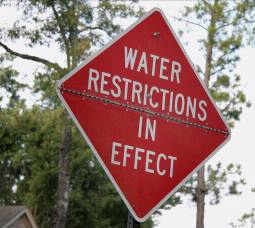FOR IMMEDIATE RELEASE
ACS News Service Weekly PressPac: February 15, 2012
Climate change may increase risk of water shortages in hundreds of U.S. counties by 2050
“Projecting Water Withdrawal and Supply for Future Decades in the U.S. under Climate Change Scenarios”
Environmental Science & Technology
More than 1 in 3 counties in the United States could face a “high” or “extreme” risk of water shortages due to climate change by the middle of the 21st century, according to a new study in ACS’s Journal of Environmental Science & Technology. The new report concluded that 7 in 10 of the more than 3,100 U.S. counties could face “some” risk of shortages of fresh water for drinking, farming and other uses. It includes maps that identify the counties at risk of shortages.
In the analysis, Sujoy B. Roy, Ph.D., and colleagues explain that population growth is expected to increase the demand for water for municipal use and for electricity generation beyond existing levels. Global climate change threatens to reduce water supplies due to decreased rainfall and other factors compared to levels in the 20th century. Roy’s group developed a “water supply sustainability risk index” that takes into account water withdrawal, projected growth, susceptibility to drought, projected climate change and other factors in individual U.S. counties for the year 2050. It takes into account renewable water supply through precipitation using the most recent downscaled climate change projections and estimates future withdrawals for various human uses.
Roy’s team used the index to conclude that climate change could foster an “extreme” risk of water shortages that may develop in 412 counties in southern and southwestern states and in southern Great Plains states. “This is not intended as a prediction that water shortages will occur, but rather where they are more likely to occur, and where there might be greater pressure on public officials and water users to better characterize, and creatively manage demand and supply,” Roy said.
The authors acknowledge funding from the Natural Resources Defense Council. The work was performed by Dr. Roy and colleagues at Tetra Tech Inc., The Nature Conservancy and Santa Clara University.
![]()
Contact
Science Inquiries: Michael Woods, Editor, 202-872-6293
General Inquiries: Michael Bernstein, 202-872-6042


